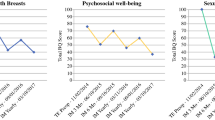Abstract
Introduction
Patient-reported outcome measures (PROM) are used to assess value-based care. Little is known as to whether PROM response in breast cancer reflects the diverse patient population. The BREAST-Q, a validated measure of satisfaction and quality of life, and Recovery Tracker, a postoperative assessment tool, are PROM routinely delivered to all patients undergoing breast surgery at our institution. Here we determine whether response to PROM differs by age, race, language, or disease stage.
Methods
All patients who had a breast operation between January 2020 and July 2021 were requested to complete the BREAST-Q and Recovery Tracker. Non-responders did not complete the PROM at any timepoint; responders completed 1 or more. Primary outcomes included rates of non-response versus response overall.
Results
Of 6374 patients identified, 5653 (88.7%) responded to either PROM [4366/4751 (91.9%) BREAST-Q; 2746/3384 (81.1%) Recovery Tracker]. On univariate analysis, non-responders were older (60 years versus 55 years, p < 0.001) and more often non-English speaking (p < 0.001), Hispanic ethnicity (p = 0.031), and Black race (p < 0.001), versus responders. On multivariate analysis, non-responders were significantly more often Black race and non-English speaking (p < 0.001). Non-English speakers were significantly less responsive among all ethnicities and races except Black race. Although breast cancer stage did not reach significance for response, patients with malignant disease and those receiving neoadjuvant chemotherapy responded more often.
Conclusions
Our findings demonstrate high patient engagement using 2 different PROM following breast surgery, but suggest that PROM results may not reflect the experience of the entire breast cancer population. Care process changes based solely on PROM should consider these findings to ensure that the views of the entire spectrum of patients with breast cancer are represented.

Similar content being viewed by others
References
Cano S, Klassen AF, Scott A, Thoma A, Feeny D, Pusic A. Health outcome and economic measurement in breast cancer surgery: challenges and opportunities. Expert Rev Pharmacoecon Outcomes Res. 2010;10(5):583–94.
Cano SJ, Klassen AF, Scott AM, Cordeiro PG, Pusic AL. The BREAST-Q: further validation in independent clinical samples. Plast Reconstr Surg. 2012;129(2):293–302.
Chen CM, Cano SJ, Klassen AF, et al. Measuring quality of life in oncologic breast surgery: a systematic review of patient-reported outcome measures. Breast J. 2010;16(6):587–97.
Tevis SE, James TA, Kuerer HM, et al. Patient-reported outcomes for breast cancer. Ann Surg Oncol. 2018;25(10):2839–45.
Efficace F, Fayers P, Pusic A, et al. Quality of patient-reported outcome reporting across cancer randomized controlled trials according to the CONSORT patient-reported outcome extension: a pooled analysis of 557 trials. Cancer. 2015;121(18):3335–42.
Basch E. Patient-reported outcomes—harnessing patients’ voices to improve clinical care. N Engl J Med. 2017;376(2):105–8.
Atisha DM, Rushing CN, Samsa GP, et al. A national snapshot of satisfaction with breast cancer procedures. Ann Surg Oncol. 2015;22(2):361–9.
Johnson TP, Wislar JS. Response rates and nonresponse errors in surveys. JAMA. 2012;307(17):1805–6.
Neve OM, van Benthem PPG, Stiggelbout AM, Hensen EF. Response rate of patient reported outcomes: the delivery method matters. BMC Med Res Methodol. 2021;21(1):220.
Pusic AL, Klassen AF, Scott AM, Klok JA, Cordeiro PG, Cano SJ. Development of a new patient-reported outcome measure for breast surgery: the BREAST-Q. Plast Reconstr Surg. 2009;124(2):345–53.
Simon BA, Assel MJ, Tin AL, et al. Association between electronic patient symptom reporting with alerts and potentially avoidable urgent care visits after ambulatory cancer surgery. JAMA Surg. 2021;156(8):740–6.
Kamin ST, Beyer A, Lang FR. Social support is associated with technology use in old age. Z Gerontol Geriatr. 2020;53(3):256–62.
Albaba H, Barnes TA, Veitch Z, et al. Acceptability of routine evaluations using patient-reported outcomes of common terminology criteria for adverse events and other patient-reported symptom outcome tools in cancer outpatients: princess Margaret cancer Centre experience. Oncologist. 2019;24(11):e1219–27.
Hutchings A, Neuburger J, Grosse Frie K, Black N, van der Meulen J. Factors associated with non-response in routine use of patient reported outcome measures after elective surgery in England. Health Qual Life Outcomes. 2012;10:34.
King-Kallimanis BL, Kanapuru B, Blumenthal GM, Theoret MR, Kluetz PG. Age-related differences in patient-reported outcomes in patients with advanced lung cancer receiving anti-PD-1/PD-L1 therapy. Semin Oncol. 2018;45(4):201–9.
Vogel MME, Eitz KA, Combs SE. Web-based patient self-reported outcome after radiotherapy in adolescents and young adults with cancer: survey on acceptance of digital tools. JMIR Mhealth Uhealth. 2021;9(1):e19727.
Withycombe JS, McFatrich M, Pinheiro L, et al. The association of age, literacy, and race on completing patient-reported outcome measures in pediatric oncology. Qual Life Res. 2019;28(7):1793–801.
Winters ZE, Benson JR, Pusic AL. A systematic review of the clinical evidence to guide treatment recommendations in breast reconstruction based on patient-reported outcome measures and health-related quality of life. Ann Surg. 2010;252(6):929–42.
Fuzesi S, Cano SJ, Klassen AF, Atisha D, Pusic AL. Validation of the electronic version of the BREAST-Q in the army of women study. Breast. 2017;33:44–9.
Kozlov N, Benzon HT. Role of gender and race in patient-reported outcomes and satisfaction. Anesthesiol Clin. 2020;38(2):417–31.
Acknowledgement
This study was presented as an oral poster at the Society of Surgical Oncology (SSO) 2022 International Conference on Surgical Cancer Care, Dallas, TX, March 9–12, 2022.
Author information
Authors and Affiliations
Corresponding author
Ethics declarations
DISCLOSURES
The preparation of this study was supported in part by NIH/NCI Cancer Center Support Grant No. P30 CA008748 to Memorial Sloan Kettering Cancer Center. Dr. Monica Morrow has received honoraria from Exact Sciences and Roche. All other authors have no conflict of interest disclosures to report.
Additional information
Publisher's Note
Springer Nature remains neutral with regard to jurisdictional claims in published maps and institutional affiliations.
Rights and permissions
Springer Nature or its licensor holds exclusive rights to this article under a publishing agreement with the author(s) or other rightsholder(s); author self-archiving of the accepted manuscript version of this article is solely governed by the terms of such publishing agreement and applicable law.
About this article
Cite this article
Srour, M.K., Tadros, A.B., Sevilimedu, V. et al. Who Are We Missing: Does Engagement in Patient-Reported Outcome Measures for Breast Cancer Vary by Age, Race, or Disease Stage?. Ann Surg Oncol 29, 7964–7973 (2022). https://doi.org/10.1245/s10434-022-12477-1
Received:
Accepted:
Published:
Issue Date:
DOI: https://doi.org/10.1245/s10434-022-12477-1




